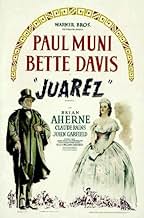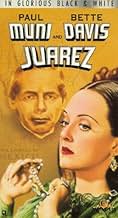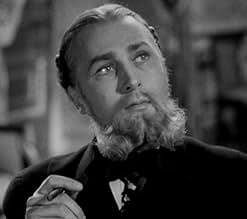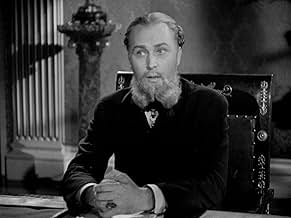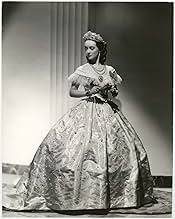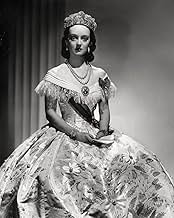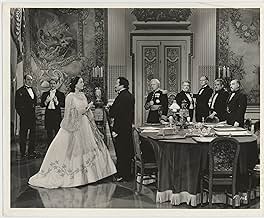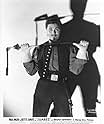Juarez
- 1939
- Tous publics
- 2h 5min
NOTE IMDb
6,9/10
2,7 k
MA NOTE
Louis Napoléon III profite de la guerre civile américaine pour contourner la doctrine Monroe et étendre son pouvoir en aidant l'empereur Maximilian Habsbourg à ajouter le Mexique à son empir... Tout lireLouis Napoléon III profite de la guerre civile américaine pour contourner la doctrine Monroe et étendre son pouvoir en aidant l'empereur Maximilian Habsbourg à ajouter le Mexique à son empire.Louis Napoléon III profite de la guerre civile américaine pour contourner la doctrine Monroe et étendre son pouvoir en aidant l'empereur Maximilian Habsbourg à ajouter le Mexique à son empire.
- Réalisation
- Scénario
- Casting principal
- Nommé pour 1 Oscar
- 3 victoires et 1 nomination au total
Avis à la une
What drew me into seeing Juarez in the first place were the cast and that Korngold wrote the music. And while it is far from perfect, there are definitely a lot of good things. It does look exquisite, not just in the lavishly rendered costumes and sets but also in the sweeping cinematography. Korngold's score is splendid also, full of the rich and rousing melodies he is famous for, if not quite on the same level as the scores he did for Prince and the Pauper, Captain Blood, The Sea Hawk and especially The Adventures of Robin Hood. The Mexican history is interesting and I did find it informative, and most of the acting is fine. In particular Bette Davis who is very compelling in her role, Brian Aherne's dignified Maximillian and Claude Rains who plays urbane better than anyone(except perhaps Cary Grant). Donald Crisp, Montagu Love and Joseph Calleia are excellent also. However there are debits, while the script is mostly literate it also suffers from being too talky and trying to tell us too much. The film is perhaps overlong, and is rather tedious in the pace at times. And two actors unfortunately didn't work for me. Paul Muni, wonderful in Scarface, The Good Earth and The Life of Emile Zola, not helped by very heavy make-up is far too stoic and stiff in the lead. And while he tries hard to give the honest intensity the small role of Porfirio Diaz, John Garfield just ended up being out of place. On the whole, a great cast, a splendid score and lavish production values are definite things to like, but Juarez is spoilt sadly by bad pacing, too much talk and two actors who don't convince as much as they should. 6/10 Bethany Cox
Juarez is a film that might possibly have been better served if the concept of a mini-series had been available back in 1939. Certainly his story in its entirety with Maximilian and Carlotta as just one part of it would be a mini-series.
Benito Juarez who rose from being an illiterate Zapotec Indian from Oaxaca province in Mexico has developed into the Mexican statesman with the biggest popular appeal in American culture. Note how in the film, he is juxtaposed with Abraham Lincoln. Both men started from very humble background and rose to lead their respective nations at the same time, in times of great crises for their countries.
Paul Muni makes an impassive and stoic Juarez. It certainly is atypical of the rest of his historical characters be it Louis Pasteur, Pierre Radisson, or Emile Zola where he is quite eloquent. It's so different than what you normally see from Muni.
Juarez's story shares the screen with that of his counterpart the Emperor Maximilian. The real Maximilian was not as naive as Brian Aherne would have us believe. He knew very well his power was there while the French army was there. Yet in his own way with limited options he tried to govern as best he could. Aherne was nominated for Best Supporting Actor, but lost to Thomas Mitchell for Stagecoach.
Hollywood usually can't resist a mad act and Bette Davis might have been nominated herself had she not been already nominated for the much better Dark Victory. It really did happen that way, the high strung Carlotta just snapped when she returned to France to get help for her beleaguered husband. She lived in her private mad world for over 60 years, dying in the mid twenties of the next century.
Claude Rains registers well as emperor Louis Napoleon and with this film played both Bonaparte emperors of France. He had played the first Napoleon in Hearts Divided. Marshal Achille Bazaine played well by Donald Crisp was withdrawn with his troops because France was very concerned, rightly so, about a growing threat from a uniting Germany and couldn't waste time with imperialist ventures. I do love the fact that the French seem so concerned about the Monroe Doctrine which was nothing more than an expression of U.S. policy, always has and always will be. It had no force of law behind it, but with the Civil War over and the Union Army at the point of Appomattox being the largest army in the world at that time, that had more to do with Napoleon deciding that the western hemisphere wasn't worth it.
An interesting side note to that retrenchment policy, Louis Napoleon also withdrew French troops from Rome and the Papal States for the same reason at the same time because of threats to the home land. It removed the last block to a uniting Italy as well.
If I have a favorite among the supporting cast it is Joseph Calleia who plays Juarez's slippery Vice President who tries a palace coup d'etat and falls very short.
The one jarring note in the cast is John Garfield who sounds more like he's from the Lower East Side of New York than Mexican as Juarez supporter and future dictator of Mexico, Porfirio Diaz.
Juarez as a film is overly ambitious, it tries to tell too much in the running time allotted. A film about Juarez and a film strictly from the Maximilian/Carlotta point of view would have been far better.
Benito Juarez who rose from being an illiterate Zapotec Indian from Oaxaca province in Mexico has developed into the Mexican statesman with the biggest popular appeal in American culture. Note how in the film, he is juxtaposed with Abraham Lincoln. Both men started from very humble background and rose to lead their respective nations at the same time, in times of great crises for their countries.
Paul Muni makes an impassive and stoic Juarez. It certainly is atypical of the rest of his historical characters be it Louis Pasteur, Pierre Radisson, or Emile Zola where he is quite eloquent. It's so different than what you normally see from Muni.
Juarez's story shares the screen with that of his counterpart the Emperor Maximilian. The real Maximilian was not as naive as Brian Aherne would have us believe. He knew very well his power was there while the French army was there. Yet in his own way with limited options he tried to govern as best he could. Aherne was nominated for Best Supporting Actor, but lost to Thomas Mitchell for Stagecoach.
Hollywood usually can't resist a mad act and Bette Davis might have been nominated herself had she not been already nominated for the much better Dark Victory. It really did happen that way, the high strung Carlotta just snapped when she returned to France to get help for her beleaguered husband. She lived in her private mad world for over 60 years, dying in the mid twenties of the next century.
Claude Rains registers well as emperor Louis Napoleon and with this film played both Bonaparte emperors of France. He had played the first Napoleon in Hearts Divided. Marshal Achille Bazaine played well by Donald Crisp was withdrawn with his troops because France was very concerned, rightly so, about a growing threat from a uniting Germany and couldn't waste time with imperialist ventures. I do love the fact that the French seem so concerned about the Monroe Doctrine which was nothing more than an expression of U.S. policy, always has and always will be. It had no force of law behind it, but with the Civil War over and the Union Army at the point of Appomattox being the largest army in the world at that time, that had more to do with Napoleon deciding that the western hemisphere wasn't worth it.
An interesting side note to that retrenchment policy, Louis Napoleon also withdrew French troops from Rome and the Papal States for the same reason at the same time because of threats to the home land. It removed the last block to a uniting Italy as well.
If I have a favorite among the supporting cast it is Joseph Calleia who plays Juarez's slippery Vice President who tries a palace coup d'etat and falls very short.
The one jarring note in the cast is John Garfield who sounds more like he's from the Lower East Side of New York than Mexican as Juarez supporter and future dictator of Mexico, Porfirio Diaz.
Juarez as a film is overly ambitious, it tries to tell too much in the running time allotted. A film about Juarez and a film strictly from the Maximilian/Carlotta point of view would have been far better.
An amazing conflagration of actors populates the cast of 1939's "Juarez" -- Brian Aherne, Paul Muni, Bette Davis, Claude Rains, John Garfield, Gale Sondergaard, Donald Crisp, Gilbert Roland, and Louis Calhern. More amazing is the size of many of their roles - small! It shows that Warner Brothers put everything behind this epic film.
The story concerns the short reign of Maximilian von Hapsburg (Aherne) as Emperor of Mexico, seduced into taking the position by Napoleon III (Rains) who convinces him that the Mexican people want a monarchy. They don't. Opposing Maximilian is the man of the people, Benito Juarez (Muni), who has the support of the United States. Both Maximilian and Juarez want many of the same things, but Maximilian's hard work to unite the Mexican people and stop the fighting fails.
Though the title is "Juarez," the workhorse role belongs to the underrated Brian Aherne, an excellent actor from the theater who took second place to Errol Flynn at Warner Brothers. Though superstardom eluded him, he was a brilliant actor and a handsome man who turned in many great performances during a 43-year career. His Maximilian is gentle, likable, strong, and sympathetic. He gets third billing to Muni and Davis. Davis plays the Empress Carlota, Maximilian's wife. It's a secondary role but she has a huge, dramatic scene when Carlota returns to France to insist that Napoleon III keep his troops in Mexico. One of the best moments in the film is Carlota, going mad and believing the French court is trying to poison her, running out into the night, her white dress slowly disappearing. Davis wears magnificent gowns and has dark hair that seems to emphasize her huge eyes even more. She looks quite beautiful and gives a solid performance as a fragile woman devoted to her husband.
Paul Muni's Juarez is stiff, and he looks and acts as if he's embalmed. Muni was a great actor who delved deeply into his roles, and it's not clear what he was thinking when he gave this performance. Undoubtedly he had researched Benito Juarez to the ground and was giving an exact representation of him. But as Bette Davis once said, "True acting is larger than life." Muni needed something more for this role but doesn't supply it. John Garfield's Porfirio Diaz is odd casting. He makes a little attempt at an accent; underneath that dark makeup is still John Garfield. Supposedly his role was cut down. Back in 1939, audiences were just getting to know him, so his performance probably held up well back then. Nowadays one only thinks, "Why is John Garfield playing a Mexican?" "Juarez" is rich in detail - it occasionally is plodding and runs a bit long in an effort to supply the historic happenings. But it is well worth seeing for the performances, the story, and those Orry-Kelly gowns.
The story concerns the short reign of Maximilian von Hapsburg (Aherne) as Emperor of Mexico, seduced into taking the position by Napoleon III (Rains) who convinces him that the Mexican people want a monarchy. They don't. Opposing Maximilian is the man of the people, Benito Juarez (Muni), who has the support of the United States. Both Maximilian and Juarez want many of the same things, but Maximilian's hard work to unite the Mexican people and stop the fighting fails.
Though the title is "Juarez," the workhorse role belongs to the underrated Brian Aherne, an excellent actor from the theater who took second place to Errol Flynn at Warner Brothers. Though superstardom eluded him, he was a brilliant actor and a handsome man who turned in many great performances during a 43-year career. His Maximilian is gentle, likable, strong, and sympathetic. He gets third billing to Muni and Davis. Davis plays the Empress Carlota, Maximilian's wife. It's a secondary role but she has a huge, dramatic scene when Carlota returns to France to insist that Napoleon III keep his troops in Mexico. One of the best moments in the film is Carlota, going mad and believing the French court is trying to poison her, running out into the night, her white dress slowly disappearing. Davis wears magnificent gowns and has dark hair that seems to emphasize her huge eyes even more. She looks quite beautiful and gives a solid performance as a fragile woman devoted to her husband.
Paul Muni's Juarez is stiff, and he looks and acts as if he's embalmed. Muni was a great actor who delved deeply into his roles, and it's not clear what he was thinking when he gave this performance. Undoubtedly he had researched Benito Juarez to the ground and was giving an exact representation of him. But as Bette Davis once said, "True acting is larger than life." Muni needed something more for this role but doesn't supply it. John Garfield's Porfirio Diaz is odd casting. He makes a little attempt at an accent; underneath that dark makeup is still John Garfield. Supposedly his role was cut down. Back in 1939, audiences were just getting to know him, so his performance probably held up well back then. Nowadays one only thinks, "Why is John Garfield playing a Mexican?" "Juarez" is rich in detail - it occasionally is plodding and runs a bit long in an effort to supply the historic happenings. But it is well worth seeing for the performances, the story, and those Orry-Kelly gowns.
Well appointed but lumbering, miscast drama. Bette is fine, all spit and fire but John Garfield, who was embarrassed by his forced casting, is completely out of place as Porfirio Diaz with his New York accent still firmly in place. Paul Muni, a very fine actor in modern dress roles, does what he always does when heavily made up; he lets the makeup do the acting for him. The best performance is delivered by Brian Aherne but he is hampered by a bizarre beard which distracts the viewer whenever he's on screen. The lack of fluid direction makes this feel more like a history lesson than a dramatized story of an actual series of events. A good try but stodgy.
This is one of five biopics that William Dieterle made for producer Hal B. Wallis at Warner Bros in as many years and the third to star Paul Muni in the title role. Excellent production values suffice it to say. Tony Gaudio is behind the camera and there is a symphonic score by Korngold arranged and orchestrated by Hugo Freidhofer with an effective use of 'La Paloma'.
Film historian David Thompson has dismissed these biopics as being Germanic and stagey. He is fully entitled to his opinion of course but I think his verdict to be harsh especially when one considers the first class actors, both leading and supporting, who appeared in these films.
The characters that linger longest in the memory from this are those of Brian Aherne as Maximilian and Bette Davis as his wife Carlotta. Aherne has never been better quite frankly while Davis is absolutely stupendous in the role. Their scenes together are beautifully understated and the scene where she confronts the ignominious Louis Napoleon, played with relish by Claude Rains, is magnificent. Her descent into madness is subtly handled.
Interesting also to see as future president Diaz that human dynamo John Garfield whose greatest roles were still to come.
Paul Muni I must confess has never really been my cup of tea but that is only my opinion.
The 'execution' of monarchs understandably has always caused more emotional outrage and controversy than that of dictators.
In this film at any rate Juarez feels remorse but his refusal to grant Maximilian a pardon is certainly a blot on his historical reputation.
Excellent film by a European director who adapted to and thrived under the Hollywood system.
As an historical document it is certainly off-centre in many respects but as a piece of entertainment it certainly hits the mark.
Le saviez-vous
- AnecdotesBecause the film shows a number of Maximilian's generals to be Mexican, many viewers attribute it to typical Hollywood historical distortions. It is, however, indeed accurate. It's a little-known fact that, although Maximilian was eventually overthrown and executed by Mexican revolutionaries, there were more Mexicans fighting on Maximilian's side than against him. This was due in large part to the Catholic Church's strong support of the French occupation of Mexico and its encouraging of Mexican Catholics to fight against the revolutionary forces by joining Maximilian's army, which they did in large numbers.
- GaffesWhen Napoleon III is informed in a letter that Robert E. Lee has been defeated at Gettysburg, he responds by paraphrasing Lincoln's famous Gettysburg Address by calling democracy as government for the people, by the people, etc. He couldn't have known Lincoln's speech flourish because it wasn't given until November 19, 1863, more than four months after the battle.
- Citations
Emperor Louis Napoleon III: Democracy! Government of the cattle, by the cattle, for the cattle!
- Versions alternativesIn 1952, the film was re-released and several key scenes were removed, particularly sequences that contained dialogue that criticized countries which, in 1939 had been regarded as totalitarian, but which, by the early 1950s had become Cold War allies of the United States and could therefore no longer be criticized as imperialist adventurers. Germany and Italy, especially, former enemies in the 1940s, were now the cornerstone of NATO. The removal of these scenes obfuscated the narrative considerably, in particular, removing any clear reasons behind the execution of the Emperor Maximilian at the conclusion of the film. This revised print runs 106 minutes and is the version released on video and generally available today. The 1939 version is preserved on nitrate stock in the Warner Archive.
- ConnexionsFeatured in Hollywood and the Stars: The Angry Screen (1964)
- Bandes originalesMy Country Tis of Thee
(uncredited)
Music attributed to Henry Carey (1744)
Played as part of the score when America is mentioned
Meilleurs choix
Connectez-vous pour évaluer et suivre la liste de favoris afin de recevoir des recommandations personnalisées
- How long is Juarez?Alimenté par Alexa
Détails
- Durée2 heures 5 minutes
- Couleur
- Mixage
- Rapport de forme
- 1.37 : 1
Contribuer à cette page
Suggérer une modification ou ajouter du contenu manquant



